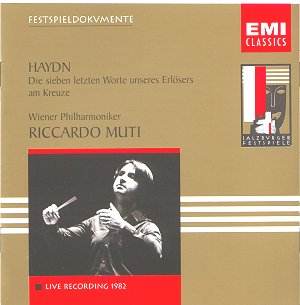Joseph HAYDN (1732 -1809)
The Seven Last Words on the Cross. [58.40]
Instrumental version.
 Vienna Philharmonic Orchestra
. Riccardo Muti
Vienna Philharmonic Orchestra
. Riccardo Muti
Recorded live at the Salzburg Festival. 25 August 1982
ADD
 EMI CDM 5 67423 2
EMI CDM 5 67423 2
Crotchet
Midprice

This disc is something of a curiosity - certainly a rarity. Haydn's setting
of "In deinen Hände befehle ich meinen Geist" ("Into Thy hands I commit
my spirit") is known primarily in its version for string quartet ( Opus 51,
Nos 1 - 7, Quartets numbers 50 - 56). Haydn originally wrote the work for
instrumental performance for a Good Friday service in Cadiz in 1786, the
String Quartet arrangement followed a year later, and ten years after he
made a version for soloists and chorus. As written originally for church
performance the seven sections, with an introduction, were each to precede
a sermon. In the composer's own description of the work, made to his London
publisher, "…..simple instrumental music divided into 7 sonatas, each
of which lasts 7 to 8 minutes, together with a preceding introduction and
a Terremoto or earthquake at the end." An intensely religious work,
Haydn also programmed a short pause after each section "so that one has time
to contemplate the forthcoming passage of text". This short pause is not
observed in the recording that was made in the highly secular, non-devotional
setting of the Festspielhaus in Salzburg at a live performance in the 1982
Festival.
The music, of course, was not written to be listened to and enjoyed in a
way that we would see it from today's viewpoint. It had a primarily religious
intention, something that is largely alien to us now if not completely lost,
so what the listener hears today is essentially seven slow movements with
the variation at the end. Not the easiest fare for an audience, and this
particular group had a number of restless souls and several coughers in its
ranks.
The Vienna Philharmonic is a magnificent orchestra and Muti used it to its
limits to extract what he could from the limitations of the score and the
format. The selection of this work was apparently entirely Muti's own choice,
and he succeeded , but this remains a work to be aware of and to appreciate
rather than as a staple of the repertoire. With music then that is largely
one-paced, and with no extremes in dynamics the lack of variety is an undoubted
problem. There is a hint of an attractive theme in Section 7, picked up in
the closing movement, but little else of overt appeal. This is predominantly
a work for strings, though there are some pleasing and welcome interpolations
from the woodwinds, notably in Sonatas II, III and VI, but dark-hued , sombre
strings predominate. The 'Earthquake' when it came was fairly low-down
on the Richter scale and was almost too genteel, too 'nice' to make the impact
anticipated.
A difficult work then to be enthusiastic about, and this is said by one who
is a great admirer of Haydn's music. The String Quartet version can be moving
in the right place and time, but sadly, this bigger scale arrangement failed
to grip.
Reviewer.
Harry Downey

